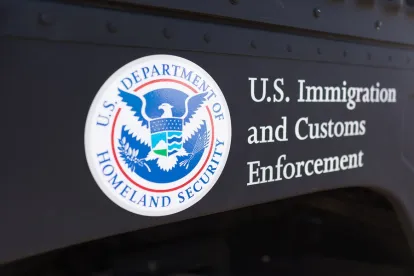Immigration and Customs Enforcement (ICE) is the enforcement arm of the U.S. Department of Homeland Security. ICE’s mission is to protect the country from cross-border crime and illegal immigration. The agency focuses on illegal trade, prevention of terrorism, and even repatriation of stolen art. ICE also is responsible for enforcement of laws related to unlawful employment of workers.
As part of its mission, ICE routinely issues a Notice of Inspection alerting business owners that it will be auditing the employer’s Form I-9s and other hiring records to determine whether they are in compliance with immigration law. Employers are required by law to produce employee Form I-9s within three business days. Employers not in compliance with the Form I-9 paperwork requirements can receive a civil fine ranging from $216 to $2,156 per Form I-9. Employers who knowingly hire or continue to employ unlawful workers may receive significantly higher civil fines, and, potentially, be criminally prosecuted.
How do employers prepare for an audit?
Employers can best prepare for an ICE audit by conducting an internal review of their Form I-9s before the agency decides to conduct a government audit. Any internal audit must be conducted carefully by experienced personnel or a third party, and avoid potential discrimination or document abuse under immigration laws. ICE and the Department of Justice Office of Special Counsel (now, Immigration and Employee Rights Division) have issued useful guidance for employers that want to conduct an internal audit of Form I-9s.
If ICE conducts a Form I-9 audit, the employer will be served with the Notice of Inspection in person. ICE also may include an administrative subpoena requesting additional payroll and tax-related information. By law, an employer has three days to provide the Form I-9s. ICE officers cannot enter the business premises without a judicial warrant unless invited by an authorized agent of the employer.
ICE raids
In addition to a Form I-9 audit, ICE may conduct an enforcement action at a business location. These actions may seek not only company Form I-9s and other records, but officials also may intend to arrest unlawful employees at the business site. In potential criminal cases, ICE also may serve a judicial warrant to search specific areas, and possibly to seize certain records or persons. Such actions are commonly referred to as ICE raids.
An ICE raid implicates potential civil and criminal charges and therefore, it is essential to consult with counsel on these matters. The following overview is meant to provide employers with basic considerations in advance of a possible ICE raid.
What to do in the event of an ICE raid
- Ask for the ICE officers to identify themselves. Ask for their names and business cards.
- If ICE has obtained a judicial search warrant, examine the judicial search warrant to ensure that it is properly signed.
- Immediately transmit the search warrant to your legal counsel.
- If ICE does not have a search warrant, they cannot enter the premises without consent of an authorized representative.
- For Employers in California: Under California law, it is unlawful for an employer to grant ICE access to any non-public area except if presented with a judicial warrant.
- Ask if counsel can come to the employer’s premises while the raid is occurring. However, ICE will not delay a raid while waiting for your attorney to arrive.
- Assign staff to accompany ICE officers as they go around the facility.
- Advise the assigned staff to take notes of all actions of the ICE officers. Staff should make a note of any items seized and ask if copies can be made before they are taken.
- Advise assigned staff not to block or interfere with the ICE officers as they go about their activities. They should remain calm and composed and not engage in any hostilities toward the agents.
- Your staff and employees are not required to give any statements to ICE officers or allow themselves to be interrogated.
- You should inform employees that they have a right to talk with ICE officers or not talk to them if they like. However, do not direct employees not to speak to agents when questioned.
- Do not engage in any activities that could support a potential harboring or obstruction charge. This includes hiding employees, aiding in their escape from the premises, providing false or misleading information, denying the presence of specific named employees, or shredding documents.
- If agents want access to locked facilities, unlock them — otherwise, agents will forcibly gain entry into locked closets or cabinets.
- After the raid, contact the families of any detained employee(s).
- Do a full debriefing of staff to determine the following:
- Whether any employees were arrested — during a raid, at home, and so on.
- What other contact the arrested employees may have had with ICE.
- What questions were asked or assertions made by ICE.
- What answers were given.
- Which employees or supervisors were discussed.
- What the detained employee’s history was with the company: who hired him, who completed the I-9, who referred him to the company for hire, what documents were used to complete the I-9, and what discussions took place at the time of hire.
- Whether the names of any former employees were included in discussions with ICE.





 />i
/>i

